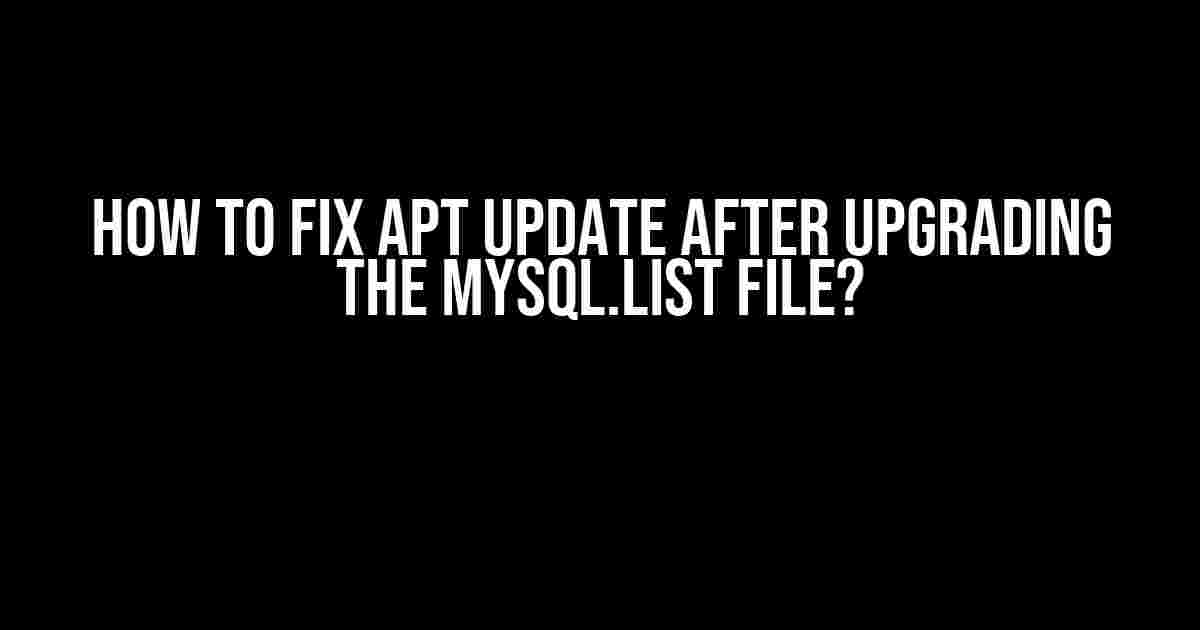If you’ve recently upgraded your MySQL.list file and found yourself stuck with an error message when running the apt update command, you’re not alone! Many users have encountered this issue, and in this article, we’ll guide you through a step-by-step process to resolve the problem and get your system running smoothly again.
What Causes the Issue?
When you upgrade the MySQL.list file, it can sometimes cause conflicts with the package manager, leading to errors when running the apt update command. This is because the MySQL.list file contains repository information that’s essential for the package manager to function correctly. If the file is modified or corrupted, it can prevent the package manager from updating correctly.
Symptoms of the Issue
If you’re experiencing this issue, you may see error messages like:
E: The repository ‘http://repo.mysql.com/apt/ubuntu focal InRelease’ is not signed. N: Updating from such a repository can’t be done securely, and is therefore disabled by default. N: See apt-secure(8) manpage for repository creation and user configuration details.
or
E: Failed to fetch http://repo.mysql.com/apt/ubuntu/dists/focal/InRelease Could not resolve ‘repo.mysql.com’ E: The repository ‘http://repo.mysql.com/apt/ubuntu focal InRelease’ is not signed.
Step-by-Step Solution
DON’T PANIC! We’ve got you covered. Follow these steps to fix the issue and get your system running smoothly again:
Step 1: Remove the MySQL.list File
First, let’s remove the MySQL.list file to start fresh. Run the following command:
sudo rm /etc/apt/sources.list.d/mysql.list
Step 2: Update the Package Index
Next, update the package index to ensure that the package manager is aware of the changes:
sudo apt update
You may still see error messages at this stage, but don’t worry, we’re getting closer to a solution!
Step 3: Re-add the MySQL Repository
Now, let’s re-add the MySQL repository using the following command:
sudo add-apt-repository ‘deb http://repo.mysql.com/apt/ubuntu/ focal mysql-8.0’
Replace focal with your Ubuntu version (e.g., bionic, xenial, etc.).
Step 4: Update the Package Index Again
Run the following command to update the package index again:
sudo apt update
This time, you should see a successful update process!
Step 5: Verify the Fix
Finally, let’s verify that the issue is resolved by running the following command:
sudo apt full-upgrade
If everything is working correctly, you should see a successful upgrade process. If you still encounter issues, you can try running sudo apt autoclean and sudo apt autoremove to clean up any remaining issues.
Troubleshooting Tips
If you’re still experiencing issues after following the above steps, here are some troubleshooting tips to help you:
- Check your internet connection: Ensure that your internet connection is stable and working correctly.
- Verify the MySQL repository: Double-check that the MySQL repository is correctly added and configured.
- Check for corrupted files: Run
sudo apt cleanandsudo apt autocleanto remove any corrupted files. - Try a different repository: If you’re using a specific repository, try switching to a different one (e.g.,
deb http://repo.mysql.com/apt/ubuntu/ bionic mysql-8.0).
Conclusion
Fixing the apt update issue after upgrading the MySQL.list file can be a frustrating experience, but by following these steps, you should be able to resolve the problem and get your system running smoothly again. Remember to stay calm, follow the instructions carefully, and don’t hesitate to seek further assistance if you need it!
| Common Errors | Solutions |
|---|---|
| E: The repository ‘http://repo.mysql.com/apt/ubuntu focal InRelease’ is not signed. | Remove the MySQL.list file and re-add the repository. |
| E: Failed to fetch http://repo.mysql.com/apt/ubuntu/dists/focal/InRelease Could not resolve ‘repo.mysql.com’ | Check your internet connection and verify the MySQL repository. |
By following this guide, you should be able to fix the apt update issue and get your system running smoothly again. If you have any further questions or concerns, feel free to ask in the comments below!
Remember to bookmark this article for future reference!
Happy troubleshooting, and see you in the next article!
Frequently Asked Question
Get your apt update up and running after upgrading the mysql.list file with these quick fixes!
What should I do if I encounter the “Failed to fetch” error during apt update?
No worries! Simply remove the mysql.list file or move it to a backup location, then run `sudo apt update` again. This should resolve the “Failed to fetch” error.
How do I restore the original mysql.list file?
Easy peasy! Just run `sudo mv /etc/apt/sources.list.d/mysql.list.bak /etc/apt/sources.list.d/mysql.list` to restore the original file from the backup.
What if I’ve already edited the mysql.list file and I want to keep the changes?
No problem! In this case, you can try running `sudo sed -i ‘s/^ deb/- deb/’ /etc/apt/sources.list.d/mysql.list` to comment out the problematic lines, then run `sudo apt update` again.
Why do I need to update the mysql.list file in the first place?
You might need to update the mysql.list file to switch to a newer version of MySQL or to change the repository URL. This ensures you receive the latest security updates and features for your MySQL installation.
Will these fixes affect my current MySQL installation?
Rest assured, these fixes only affect the apt update process and won’t touch your existing MySQL installation. Your data and configurations remain intact.



